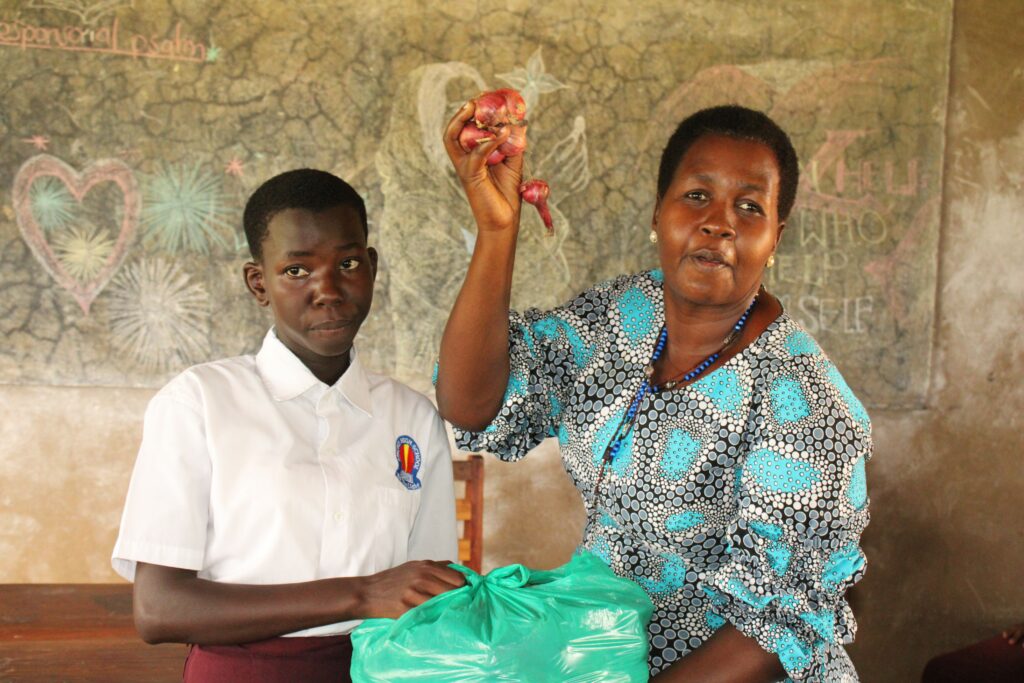By David Magere
As a way of reducing the burden of school fees and school requirements from their parents, guardians and sponsors alone, Students of Amuru High School in Amuru Sub-county and Amuru District have adopted small scale vegetable growing at their school as supplement to their school fees and needs.
The students are growing different vegetables including amongst others onions, cabbage, tomatoes, eggplants, etc for raising money while studying.
Senet Atim, a senior Two (S.2) student at the school said that she ventured in onions and harvested up to two bags which was roughly 8 kilograms.
Atim expressed that she sold her onions up to Sh. 200,000 selling each kilo at Sh. 20,000 after the Amuru Woman Member of Parliament (MP) offered to buy it at a hiogher price.
Kenneth Omara, a S.1 student who adopted the project said that he ventured into growing tomatoes and harvested seven basins.
Omara explained that got Sh. 80, 000 from the seven basin after selling it in a quantity of five tomatoes at Shs. 500.
“I harvested seven buckets of tomatoes-whereby I sold it at Sh. 500 for five tomatoes that earned me up to Sh. 80,000 and I have saved Sh. 40,000 already”, said Omara.
Kevin Langec, a S.3 student said that she cultivated cabbage at the beginning of the term and she harvested at least 10 kilograms (roughly two sacks).
Langec explained that she sold her cabbages at Sh. 5,000 for each kilogram that earned her Sh. 50,000 that she used to buy some of the scholastic necessities including books, a pair of socks, soap, cosmetics-that were mostly offered by her parents.
Langec added that she was encouraged by her teacher who also helped her in securing the cabbage seeds that they planted in the nursery bed before transplanting it.
Lucy Akello (Honorable), the Amuru District Woman Member of Parliament (MP) upon visiting the school applauded the students for adopting such a productive activity.
“I had come purposely to buy the vegetables the students were selling. The money I am giving them in exchange shall the purpose of extending the capacity to have access to the items that they would delay to get without extended help”, said Hon. Akello.
Hon. Akello remarked that it is not in order for the students to leave all the burden of providing school necessities to parents and caretakers alone.
Ricard Olweny, the head of Agriculture and Directory of Industrial Training (DIT) Department in the school said that they needed to help the students become productive while still at school.
Hon. Akello expressed that it is not in order for parents to be providing everything to their students, and asked other students in the district to adopt the move.
Isaac Tokwiny, the Director of the School said that it is very encouraging to see students embrace new means of solving their own problems.
Tokwiny said that students needs critical thinking in problem solving – something that the young students have demonstrated.
He said that he is delighted by the fact that the students produced over 3,000 kilograms of vegetable that earned them close to 13 million combined together.

School SACCO Saving
The students are also involved in a saving group-where they put some money aside for it to grow.
Richard Opiyo, the Head of Agriculture, Entrepreneurship and Directorate of Industrial Training (DIT) at the school said that they also thought it wise to instill in the students entrepreneurial skills alongside their Agricultural business practices.
Opiyo explained that they saving is geared towards registering these Entrepreneurial practicing Students to DIT in fulfilment of the Ministry’s dream of skilling Student through the new school curriculum.
He added that hopefully, the students are very likely to be enrolled and registered into DIT in Kampala-where they will in position to seat examinations examined by DIT to bring allow their vocational and technical skills.
Amuru High School is a Private Secondary school that started in 2016 with the dream of bringing education closure to the locals who walk along distance to access secondary education-being a remote locality in the country with fewer secondary schools that are scattered.





